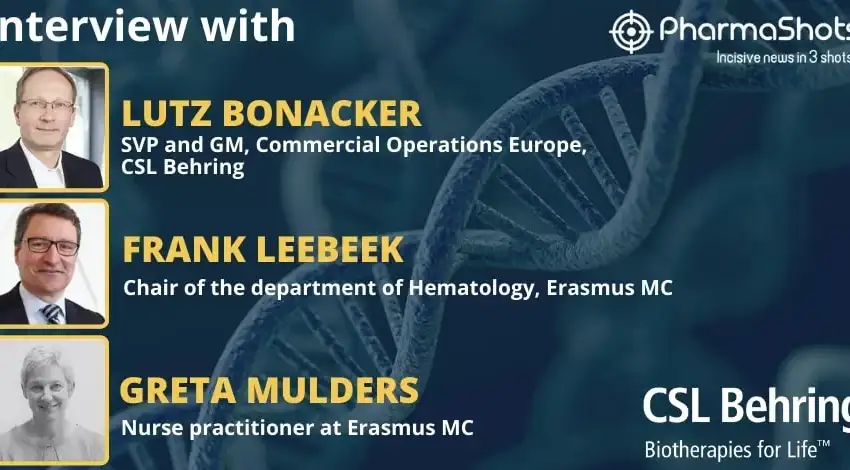PharmaShots Interview: Myovant’s Juan Camilo Arjona Ferreira Shares Insights on the Ryeqo
In an interview with PharmaShots, Myovant’s Juan Camilo Arjona Ferreira, MD, Chief Medical Officer of Myovant Sciences shares his views on the CHMP’s positive opinion for Ryeqo (Relugolix Combination Tablet).
Shots:
- The CHMP has adopted positive opinion recommending approval of Ryeqo (relugolix 40 mg, estradiol 1.0 mg, and norethindrone acetate 0.5 mg) for the treatment of moderate to severe symptoms of uterine fibroids in adult women of reproductive age
- The positive CHMP opinion further validates Ryeqo’s potential to effectively address heavy menstrual bleeding and pain associated with uterine fibroids and serve as an important new treatment option for patients and physicians
- The EC will review the CHMP recommendation for Ryeqo, and a final decision on the MAA is expected to be available in approximately two months after the CHMP opinion.
Tuba: Discuss the key points of the CHMP’s positive opinion for Ryeqo (Relugolix Combination Tablet)
Dr. Arjona Ferreira: We’re pleased to share that on May 21, 2021, the Committee for Medicinal Products for Human Use (CHMP) of the European Medicines Agency adopted a positive opinion recommending approval of RYEQO (relugolix 40 mg, estradiol 1.0 mg, and norethindrone acetate 0.5 mg) for the treatment of moderate to severe symptoms of uterine fibroids in adult women of reproductive age. The CHMP’s positive opinion further validates RYEQO’s potential to effectively address heavy menstrual bleeding and pain associated with uterine fibroids and, if approved, serve as an important new treatment option for patients and physicians.
Tuba: Let us know the key features of RYEQO (Relugolix combination tablet)?

Source: Myovant Science
Dr. Arjona Ferreira: RYEQO is being evaluated for the treatment of moderate to severe symptoms associated with uterine fibroids in adult women of reproductive age. If approved, RYEQO has the potential to provide much-needed symptom relief with the convenience of an oral, once-daily tablet.
Tuba: When can we expect its approval of the therapy in the US and Europe?
Dr. Arjona Ferreira: On May 26, 2021, Myovant and Pfizer announced that the U.S. Food and Drug Administration (FDA) approved the therapy, which is branded as MYFEMBREE (relugolix 40 mg, estradiol 1 mg, and norethindrone acetate 0.5 mg) in the U.S. It is the first once-daily treatment for the management of heavy menstrual bleeding associated with uterine fibroids in premenopausal women, with a treatment duration of up to 24 months.
The European Commission will review the CHMP recommendation for RYEQO, and a final decision on the Marketing Authorization Application is expected to be available in approximately two months after the CHMP opinion. The decision will be applicable to all 27 European Union member states plus Iceland, Norway, and Liechtenstein. Gedeon Richter will commercialize RYEQO for uterine fibroids in Europe.
Tuba: Discuss the clinical data of the P-III LIBERTY program on which the CHMP’s positive opinion is based.
Dr. Arjona Ferreira: The positive opinion recommending approval is based on safety and efficacy data from the Phase 3 LIBERTY program, which consisted of two replicate, 24-week, multinational clinical studies (LIBERTY 1 and LIBERTY 2), a one-year extension study, and a randomized withdrawal study assessing the safety and efficacy for up to two years of relugolix combination therapy (relugolix 40 mg plus estradiol 1.0 mg and norethindrone acetate 0.5 mg). Results from the LIBERTY 1 and LIBERTY 2 studies were published in the New England Journal of Medicine in February 2021.
Phase 3 LIBERTY 1 and LIBERTY 2 met the primary endpoint (p <0.0001) with 73.4% and 71.2% of women receiving relugolix combination therapy achieving the responder criteria compared with 18.9% and 14.7% of women receiving placebo at 24 weeks, respectively. A response was defined as a menstrual blood loss volume of less than 80 mL and a 50% or greater reduction from baseline in menstrual blood loss volume during the last 35 days of treatment measured using the alkaline hematin method. On average, women receiving relugolix combination therapy in both studies experienced an 84.3% reduction in menstrual blood loss from baseline (p < 0.0001). Bone mineral density was comparable between the relugolix combination therapy and placebo groups in LIBERTY 1 and LIBERTY 2. The overall incidence of adverse events in the relugolix combination and placebo groups was comparable in both studies.
The open-label extension study also met the primary endpoint with relugolix combination therapy demonstrating an 87.7% response rate at one year, showing the durability of the response observed in LIBERTY 1 and LIBERTY 2. In addition, women experienced, on average, an 89.9% reduction in menstrual blood loss from baseline. Changes in bone mineral density through one year, as assessed by DXA every three months, were consistent with LIBERTY 1 and LIBERTY 2. Adverse events reported in more than 10% of women treated with relugolix combination therapy for one year and more than those reported in the placebo group after 6 months included only hot flush.
The randomized withdrawal study demonstrated 78.4% of women who continued on relugolix combination therapy remained responders through Week 76 compared with 15.1% of women who discontinued treatment at Week 52 (p < 0.0001). Through two years, 69.8% of women who continued relugolix combination therapy remained responders. Bone mineral density was maintained through two years in the subset of women treated with relugolix combination therapy.
Tuba: With the limited options of treatment of uterine fibroids available in Europe, will RYEQO prove to be a boom medicine for women suffering from this disease?
Dr. Arjona Ferreira: There are many women with debilitating symptoms of uterine fibroids who have not had success with currently available treatments and many more who haven’t yet had a conversation with a healthcare provider. There are women who are suffering in silence. RYEQO provides the convenience of an oral, once-daily tablet, and if approved, it’s an important step forward for the treatment of symptoms associated with uterine fibroids, which has historically relied heavily on invasive procedures.
Tuba: Unveil the potential of Relugolix in redefining care for women’s living?
Dr. Arjona Ferreira: At Myovant, we believe a transformative effort is needed to make significant progress for women. We know women make the majority of healthcare decisions for their families, and yet, these same women are sidelined by common debilitating diseases, like uterine fibroids. We are committed to providing innovative therapies, like RYEQO, as women with uterine fibroids have had limited non-invasive treatment options to help manage their symptoms. As an OBGYN by training, I know firsthand how critical it is to have an effective pharmacologic treatment option for uterine fibroids, which affect more than 25% of women. Women and healthcare providers want choices when it comes to safely and effectively address symptoms. Having different treatment options, including those beyond surgery, is important for improving care for women with uterine fibroids.
Tuba: Put some light on the destructive disease called Uterine Fibroids? How do uterine fibroids affect the body?
Dr. Arjona Ferreira: Uterine fibroids are common hormone-driven benign growths that develop from the muscle tissue of the uterus. Although uterine fibroids are benign tumors, they can cause debilitating symptoms such as heavy menstrual bleeding and pain, which can lead to loss of productivity at work, limitations in normal activities of daily living, and social embarrassment. Typical treatment often involves a surgical procedure to remove the benign tumors or even a hysterectomy.
Tuba: What are other indications in which you are exploring RYEQO?
Dr. Arjona Ferreira: Relugolix combination tablet has completed Phase 3 studies for women with endometriosis. In January 2021, our Phase 3 SPIRIT long-term extension study in women with endometriosis reported clinically meaningful reductions in dysmenorrhea (menstrual pain) and non-menstrual pelvic pain over one year with minimal and stable bone mineral density loss. Relugolix combination tablet is also being assessed for contraceptive efficacy in healthy women ages 18-35 years who are at risk for pregnancy.
Tuba: Can we have a glance at the pipeline of the Myovant Sciences?
Dr. Arjona Ferreira: Relugolix monotherapy (approved and marketed in the U.S. under the brand name ORGOVYX) is currently under regulatory review in Europe for men with advanced prostate cancer. EC decision on the MAA is expected in the calendar year 2022.
We are also developing MVT-602, an oligopeptide kisspeptin-1 receptor agonist, which has completed a Phase 2a study for female infertility as part of assisted reproduction.
Image Source: Qoctor
About Juan Camilo Arjona Ferreira:

Dr. Arjona Ferreira is the CMO at Myovant Sciences. Dr. Arjona Ferreira earned his MD and completed his postgraduate specialist training in Obstetrics and Gynecology at Colegio Mayor del Rosario in Bogota, Colombia.




